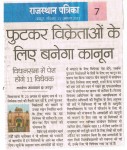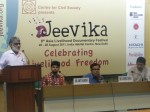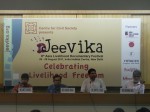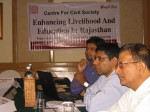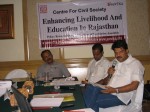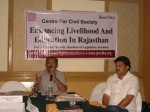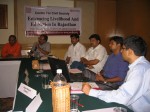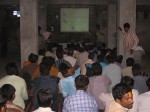Rajasthan state assembly passed Urban Street Vendor Bill 2011 (Nagar Path Vikreta Adhinyam) on August 29, 2011. The bill is based on the Model Urban Street Vendor Bill which was prepared by Ministry of Housing and Urban Poverty Alleviation, Government of India in 2009. The bill would replace the existing Rajasthan Street Vendor Policy, ‘Pheriwalo Ka Sansar’ of 2007 which couldn’t be very effective. The bill aims to ensure protection of livelihood of more than 1 million urban street vendors who live under constant threat of loss of their means of livelihood and will regulate street markets of Rajasthan. To recognize the historic development and create awareness among the street vendors, Jeevika Campaign along with Heritage City Thadi Thela Union, Jaipur organized a huge conference of street vendors of Jaipur. Thousands of street vendors from all over Jaipur along with street vendor representatives fromJodhpur, Jallore, Jaisalmer, Sirohi andKota participated in the conference.
Dr. Mahesh Joshi, Member of Parliament joined as Chief Guest and Mr. Pratap Singh Khachariwas, Member of Legislative Assembly joined as guest of honour in the conference. Mayor of the city, Mrs Jyoti Khandelwal couldn’t participate in the conference even after giving confirmation due to last minute important meeting.
Amit Chandra, Jeevika Campaign coordinator briefed the street vendors on the major provisions of the bill. Addressing the conference he said, “The objective of the conference is to create awareness about the recently passed bill on street vending to all the street vendors. The bill recognizes street vendors a legitimate part of the city. Passing of the bill is a major achievement for all the street vendor unions of the state. However, the bill is silent on few of the important aspects of street vending. Hence, it is important to keep a close watch on schemes and rules which will be prepared under the provisions of the bill. We need to plan our strategy to push the local government to start implementation of the bill in a manner that benefits the ailing condition of poor street vendors.”
Addressing the conference Member of Legislative Assembly, Mr Pratatp Singh Khachriyawas said, “Our government is committed to work for poor of the state. Street vendors play important role in local economy but still they were illegal so far. This bill recognizes the positive contribution of the street vendors and gives them legal identity. I congratulate the organizers for organizing the seminar and urge them to continue their effort until benefit of the legislation reaches to the target group.”
Chief Guest at the conference Dr Mahesh Joshi said, “Street vendors are the self employed poor who contribute significantly to convenience of common citizen by providing goods and services at our door steps. By the passing of this law on street vending, Rajasthan government has fulfilled its promise to work for development of the poor. It is a historic development for poor in state. This bill would prove to be a milestone in getting the legal recognition to millions of poor street vendors of the state.”
The conference was also addressed by Mr Uday Singh Rathore, former MLA, MrSanjay Gargand all the street vendor representatives. Thanking note was given by Jeevika Campaign Associate, Mr Amit Kumar Gond.
Here is the news clip which appeared on BTV News:
Here is press coverage of the conference:
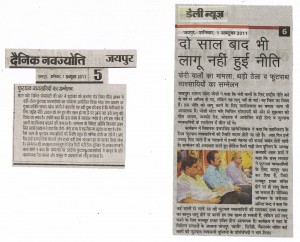
Press Coverage
Here are few pictures of the conference:
-

- MLA, Pratap Singh Khachariyawas Addressing the Conference
-

- MP, Mahesh Joshi Addressing the Conference
-

- Ex MLA, Uday Singh Rathore Addressing the Conference
-

- Street Vendor Leaders Giving Bit to Media
-

- Street Vendors at the Conference
-

- Amit Chanra Welcoming Guests
-

- Amit Chandra Briefing Street Vendor Bill
-

- Guests of Honour at the Conference
-
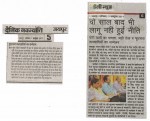
- Press Coverage












